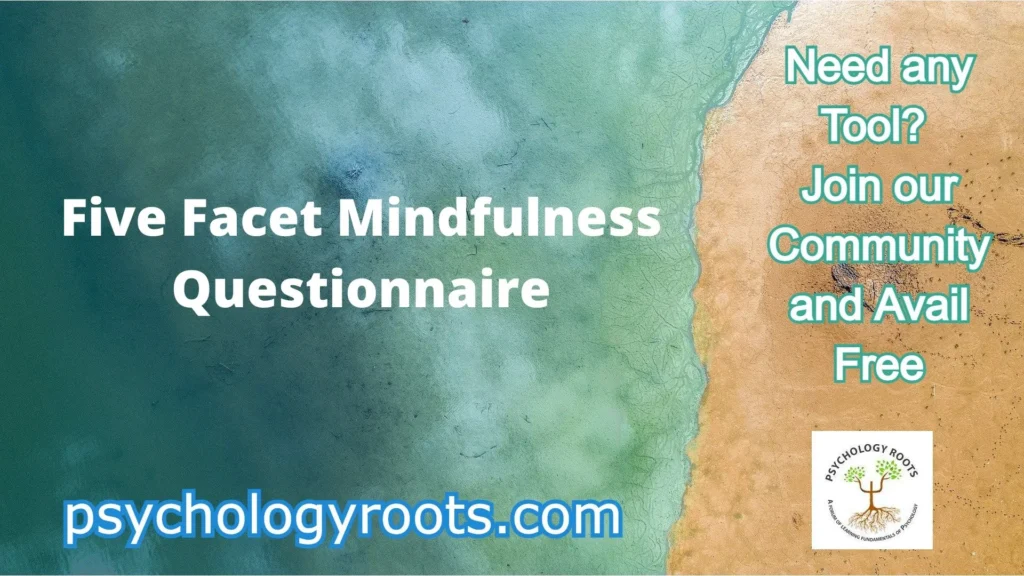Table of Contents
Five Facet Mindfulness Questionnaire
Here in this post, we are sharing the “Five Facet Mindfulness Questionnaire”. You can read psychometric and Author information. We have thousands of Scales and questionnaires in our collection (See Scales and Questionnaires). You can demand us any scale and questionnaires related to psychology through our community, and we will provide you with a short time. Keep visiting Psychology Roots.
About Scale Name
Scale Name
Five Facet Mindfulness Questionnaire
Author Details
The Five Facet Mindfulness Questionnaire (FFMQ) was developed by a team of researchers led by Dr. Kirk Warren Brown and Dr. Richard Ryan at the University at Rochester in the United States.
Translation Availability
Translated into include Spanish, German, French, Italian, Portuguese, Chinese, Japanese, Korean, and Thai.
Urdu Translation
Not Sure

Background/Description
The Five Facet Mindfulness Questionnaire (FFMQ) is a self-report measure used to assess an individual’s level of mindfulness. Mindfulness is a state of active, open attention to the present. This means that when you’re being mindful, you’re paying attention to what’s happening right now, without judgment. Mindfulness is considered an important aspect of overall well-being and has been associated with a number of mental and physical health benefits.
The FFMQ assesses five facets of mindfulness: observing, describing, acting with awareness, non-judging of inner experience, and non-reactivity to inner experience. These facets are based on the operational definition of mindfulness developed by Dr. Jon Kabat-Zinn, which describes mindfulness as paying attention in a particular way: on purpose, in the present moment, and non-judgmentally.
The FFMQ consists of 39 items that are rated on a five-point Likert scale, with higher scores indicating higher levels of mindfulness. The questionnaire has been found to have good reliability and validity, and is widely used in research on mindfulness and its effects on mental and physical health.
The FFMQ has been widely used in multiple studies in different populations and cultures, and it has been translated in several languages. It has been used to investigate the relationship between mindfulness and various mental health conditions such as anxiety, depression, stress, and personality characteristics. It has also been used to investigate the relationship between mindfulness and physical health conditions such as chronic pain, insomnia, and cardiovascular diseases.
Scoring
The Five Facet Mindfulness Questionnaire (FFMQ) is scored by summing the scores for each item across the five facets of mindfulness: observing, describing, acting with awareness, non-judging of inner experience, and non-reactivity to inner experience. Each item is rated on a five-point Likert scale, where 1 indicates “never or very rarely true” and 5 indicates “very often or always true”.
The scores for each facet are then calculated by summing the item scores for that facet. The total score for the FFMQ is the sum of the scores for all five facets. Higher scores on the FFMQ indicate higher levels of mindfulness.
Reliability and Validity
The Five Facet Mindfulness Questionnaire (FFMQ) has been found to have good reliability and validity.
In terms of reliability, several studies have shown the FFMQ to have good internal consistency, with Cronbach’s alpha coefficients ranging from 0.70 to 0.90 for the total scale and from 0.60 to 0.80 for the facets. Additionally, the FFMQ has also been found to have good test-retest reliability, with moderate to high correlation coefficients between test and retest scores.
In terms of validity, several studies have shown the FFMQ to have good construct validity. It has been found to be related to other measures of mindfulness and psychological well-being, such as the Kentucky Inventory of Mindfulness Skills (KIMS) and the Positive and Negative Affect Scale (PANAS). It also has been found to be related to other measures of mental and physical health such as stress, anxiety, depression, chronic pain, insomnia and cardiovascular diseases.
Overall, the research supports the use of the FFMQ as a valid and reliable measure of mindfulness. However, it’s important to note that it’s a self-reported measure and that the scores should be interpreted in the context of the individual, comparing it with normative data of similar population.
Available Versions
The Five Facet Mindfulness Questionnaire (FFMQ) was first developed in its original 39-item version by Dr. Kirk Warren Brown and Dr. Richard Ryan at the University at Rochester.
Since then, several versions of the FFMQ have been developed for specific populations and cultures. For example, a shorter 15-item version of the FFMQ has been developed for use in clinical populations, and a Chinese version of the FFMQ has been developed for use with Chinese populations.
Reference
Brown, K. W., & Ryan, R. M. (2003). The assessment of mindfulness and self-compassion. Assessment, 10(2), 224-237.
Important Link
Scale File:
Help Us Improve This Article
Have you discovered an inaccuracy? We put out great effort to give accurate and scientifically trustworthy information to our readers. Please notify us if you discover any typographical or grammatical errors.
Make a comment. We acknowledge and appreciate your efforts.
If you have any scale or any material related to psychology kindly share it with us at psychologyroots@gmail.com. We help others on behalf of you.